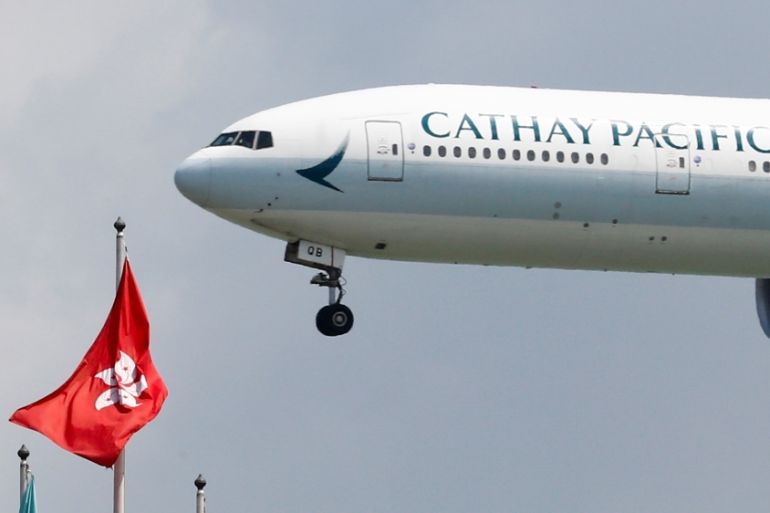Virus to drag Cathay Pacific into losses for first half of 2020
The Hong Kong airline, which saw profits drop 28 percent in 2019, also expects to cut more capacity due to the virus.

Hong Kong‘s Cathay Pacific Airways said on Wednesday it expects to report a substantial loss in the first half of this year and slash more capacity as the coronavirus outbreak erodes travel demand, after posting a drop in 2019 earnings.
The carrier has been at the forefront of a global slump in travel demand due to the epidemic, compounding a hit it took in the second half of 2019 from widespread, sometimes violent anti-government protests in Chinese-ruled Hong Kong.
Keep reading
list of 3 itemsUnited Airlines, JetBlue slash flights and spending due to virus
Hong Kong’s Cathay defers Airbus plane deliveries as demand falls
It also faced mounting Chinese scrutiny after some staff supported the demonstrations.
Cathay posted a drop of 28 percent in net profit for the year ended December 2019 to 1.69 billion Hong Kong dollars ($218m) from 2.35 billion Hong Kong dollars ($302.5m) profit in 2018.
But the worst is not over for the airline yet, as it now grapples with a fresh crisis due to the coronavirus outbreak. Cathay said it has slashed capacity across its network by 65 percent in March and April, up from earlier plans for a 40-percent cut, as travel demand has been hit globally.
“Travel demand has dropped substantially and we have taken a number of short-term measures in response,” Cathay Chairman Patrick Healy said in a statement.
“These have included a sharp reduction of capacity in our passenger network. Despite these measures, we expect to incur a substantial loss for the first half of 2020.”
The airline said that at the end of February, planes were flying half-full despite capacity cuts of 30 percent and air fares had also fallen significantly compared with the prior year.
Cathay said it had unrestricted liquidity of 20 billion Hong Kong dollars ($2.57bn) and it expected the situation to remain an ongoing concern given the availability of sources of funds and cost-cutting measures such as asking all staff to take three weeks of unpaid leave.
Its largest shareholders include Swire Pacific Ltd, Air China Ltd and Qatar Airways.